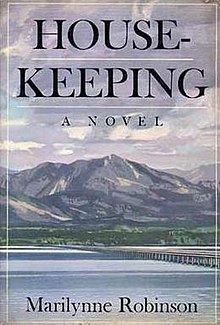Housekeeping (novel)

First edition cover
|
|
| Author | Marilynne Robinson |
|---|---|
| Country | United States |
| Language | English |
| Published | 1980 Farrar, Straus and Giroux |
| Media type | Print (hardback & paperback) |
| Pages | 219 pp |
| ISBN | |
| OCLC | 6602826 |
| 813/.54 19 | |
| LC Class | PS3568.O3125 H6 1980 |
Housekeeping is a novel by Marilynne Robinson. It was published in 1980, a finalist for the Pulitzer Prize for Fiction (which Robinson would eventually win for her second novel, Gilead), and awarded the PEN/Hemingway Award for best first novel.
In 2003, the Guardian Unlimited named Housekeeping one of the 100 greatest novels of all time, describing the book thus: "Haunting, poetic story, drowned in water and light, about three generations of women." Time magazine also included the novel in its TIME 100 Best English-language Novels from 1923 to 2005.
Ruthie narrates the story of how she and her younger sister Lucille are raised by a succession of relatives in the fictional town of Fingerbone, Idaho (some details are similar to Robinson's hometown, Sandpoint, Idaho). Eventually their aunt Sylvie (who has been living as a transient) comes to take care of them. At first the three are a close knit group, but as Lucille grows up she comes to dislike their eccentric lifestyle and moves out. When Ruthie's well-being is ultimately questioned by the courts, Sylvie returns to life on the road and takes Ruthie with her.
The novel treats the subject of housekeeping, not only in the domestic sense of cleaning, but in the larger sense of keeping a spiritual home for one's self and family in the face of loss, for the girls experience a series of abandonments as they come of age.
The events take place in an uncertain time, in that no dates are mentioned; however, Ruthie refers to her grandfather living in a sod dugout in the Midwest, before his journey to Fingerbone, while she herself traverses adolescence sometime in the latter half of the 20th century, as Ruthie reads the novel Not as a Stranger, a bestseller from 1954.
Ruth – Ruthie is the narrator of the story. She narrates from the perspective of the transparent eyeball. This narration style was used by the transcendentalist authors that influenced Marilynne Robinson, including Ralph Waldo Emerson.
Lucille – Ruth's younger sister.
...
Wikipedia
